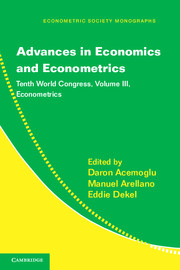Book contents
- Frontmatter
- Contents
- Contributors
- Preface
- I ECONOMETRICS OF INDUSTRIAL ORGANIZATION
- 1 Game Theory and Econometrics: A Survey of Some Recent Research
- 2 Recent Developments in Empirical IO: Dynamic Demand and Dynamic Games
- 3 Estimation of (Dynamic) Games: A Discussion
- II MACROECONOMETRICS
- III ECONOMETRIC THEORY
- IV EMPIRICAL MICROECONOMICS
- V TIME SERIES AND PANELS
- VI MIRRLEES REVIEW: RETHINKING THE TAX SYSTEM FOR THE TWENTY-FIRST CENTURY
- Name Index
- Miscellaneous Endmatter
2 - Recent Developments in Empirical IO: Dynamic Demand and Dynamic Games
Published online by Cambridge University Press: 05 May 2013
- Frontmatter
- Contents
- Contributors
- Preface
- I ECONOMETRICS OF INDUSTRIAL ORGANIZATION
- 1 Game Theory and Econometrics: A Survey of Some Recent Research
- 2 Recent Developments in Empirical IO: Dynamic Demand and Dynamic Games
- 3 Estimation of (Dynamic) Games: A Discussion
- II MACROECONOMETRICS
- III ECONOMETRIC THEORY
- IV EMPIRICAL MICROECONOMICS
- V TIME SERIES AND PANELS
- VI MIRRLEES REVIEW: RETHINKING THE TAX SYSTEM FOR THE TWENTY-FIRST CENTURY
- Name Index
- Miscellaneous Endmatter
Summary
Introduction
Important aspects of competition in oligopoly markets are dynamic. Demand can be dynamic if products are storable or durable, or if utility from consumption is linked intertemporally. On the supply side, dynamics can be present as well. For example, investment and production decisions have dynamic implications if there is “learning-by-doing” or if there are sunk costs. Identifying the factors governing the dynamics is key to understanding competition and the evolution of market structure and for the evaluation of public policy. Advances in econometric methods and modeling techniques and the increased availability of data have led to a large body of empirical papers that study the dynamics of demand and competition in oligopoly markets.
A key lesson learned early by most researchers is the complexity and challenges of modeling and estimating dynamic structural models. The complexity and “curse of dimensionality” are present even in relatively simple models but are especially problematic in oligopoly markets in which firms produce differentiated products or have heterogeneous costs. These sources of heterogeneity typically imply that the dimension of these models, and the computational cost of solving and estimating them, increases exponentially with the number of products and the number of firms. As a result, much of the recent work in structural econometrics in IO focuses on finding ways to make dynamic problems more tractable in terms of computation and careful modeling to reduce the state space while properly accounting for rich heterogeneity, dynamics, and strategic interactions.
- Type
- Chapter
- Information
- Advances in Economics and EconometricsTenth World Congress, pp. 53 - 122Publisher: Cambridge University PressPrint publication year: 2013
- 24
- Cited by



